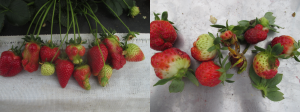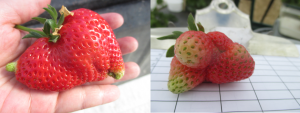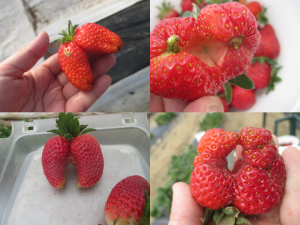This article discusses the abiotic factors that may cause deformed strawberry fruit.
Unevenly developed strawberry fruit (Figure 1):
Frost damage is probably the most common abiotic factor causing misshapen strawberry fruit. Temperatures lower than 30°F kill the pistil (female part) of strawberry flowers. Depending on the extent of the injury and the stage of fruit development. The entire pistillate portion of the flower may be killed, which will result in the loss of fruit. If a few pistils are killed, fruit expansion stops where pistils were killed. The damaged fruit then develops unevenly, resulting in misshapen fruit.
Lack of wind for pollination is less likely a problem for field strawberry production but can be a concern for high tunnel production. Because high tunnels are typically closed at the peak strawberry blooming stage in order to maintain heat, air movement is very limited inside of the high tunnel. This can cause poor pollination. This problem can be solved by partially opening high tunnel sides a few hours during the day, or manually disturbing the foliage daily during the blooming stage. Bloom typically happens in March in southern Indiana.
Fasciated fruit (Figure 2):
Fasciated fruit have fully developed receptacles and seeds, which means this kind of malformation is not related to poor pollination or frost damage. Fasciation is generally considered a varietal characteristic, It was suspected that fasciated fruit maybe accentuated by environmental conditions in fall, such as too short of day length that influences flower bud development. Fasciated fruit may not necessarily mean they are defective. Actually, they may be attractive in the local market because of the large size and unique shape.
Figure 2. Fasciated strawberry fruit
Hollow heart and split fruit (Figure 3)
This deformation in strawberry fruit is also a varietal characteristic and less likely to be caused by poor pollination and frost damage. In a cultivar trial involving ten recently released cultivars, we noticed it happens most frequently on cultivar Fronteras. The fruit splits, has two tips and a hollow center. Similar to fasciated fruit, hollow heart fruit does not affect the quality and may be attractive in the local market. But in the USDA standard, it may be rated as a defective. Other than genetically related, we are not sure why this happens. Some suspect that it might be caused by the fruits rapid growth due to excessive fertility.
Figure 3. Hollow heart and split strawberry fruit.


